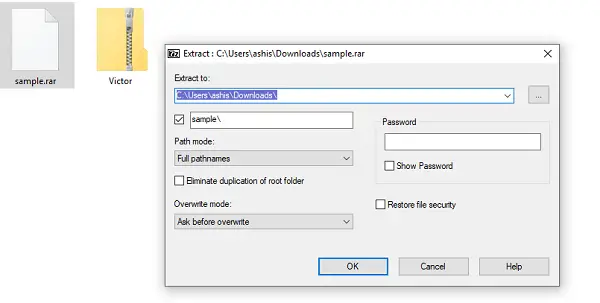

Eventually you’ll have all the files present in your RAR/ZIP archive.
Click OK and wait while the files are extracted. But most importantly, you have to check the Keep broken files option under the Miscellaneous section.  Choose the destination folder where you want to extract the files. Click Extract to in the toolbar at the top. Double-click your corrupted RAR or ZIP archive to open it in WinRAR. WinRAR has an option to extract broken files using which you can actually extract the broken or corrupt files – ignoring all the errors no matter what. Then you can attempt to extract the content in the RAR/ZIP archive. Unfortunately, after repairing RAR/ZIP archive, WinRAR may still say the file is corrupt. You’ll see a repaired archive created in the same folder as the corrupted archive. After WinRAR has completed repairing the archive, click the Close button. Leave the archive type as what it was and click OK. Click the Browse button to select the destination location where the repaired RAR/ZIP file has to be saved. When WinRAR opens, click the Tools menu and select Repair archive. Right-click on your corrupted RAR or ZIP file and select “ Open with WinRAR” from the context menu. If you don’t have a licensed copy of WinRAR, you can download a free evaluation copy which gives you about 40 days to try it out. Method 1: Repair Corrupted or Damaged RAR/ZIP File Using WinRARīefore get started, you need to download and install WinRAR on your computer. In this tutorial we’ll show you 2 ways to repair a RAR or ZIP archive whether it’s damaged, corrupted or partially downloaded. When a redownload is not possible, you have to look for ways to repair the RAR/ZIP file. Try downloading the file again and it may resolve the issue. It’s quite common to get a corrupted RAR/ZIP file when you download it from the Internet with low or unstable Internet connection.
Choose the destination folder where you want to extract the files. Click Extract to in the toolbar at the top. Double-click your corrupted RAR or ZIP archive to open it in WinRAR. WinRAR has an option to extract broken files using which you can actually extract the broken or corrupt files – ignoring all the errors no matter what. Then you can attempt to extract the content in the RAR/ZIP archive. Unfortunately, after repairing RAR/ZIP archive, WinRAR may still say the file is corrupt. You’ll see a repaired archive created in the same folder as the corrupted archive. After WinRAR has completed repairing the archive, click the Close button. Leave the archive type as what it was and click OK. Click the Browse button to select the destination location where the repaired RAR/ZIP file has to be saved. When WinRAR opens, click the Tools menu and select Repair archive. Right-click on your corrupted RAR or ZIP file and select “ Open with WinRAR” from the context menu. If you don’t have a licensed copy of WinRAR, you can download a free evaluation copy which gives you about 40 days to try it out. Method 1: Repair Corrupted or Damaged RAR/ZIP File Using WinRARīefore get started, you need to download and install WinRAR on your computer. In this tutorial we’ll show you 2 ways to repair a RAR or ZIP archive whether it’s damaged, corrupted or partially downloaded. When a redownload is not possible, you have to look for ways to repair the RAR/ZIP file. Try downloading the file again and it may resolve the issue. It’s quite common to get a corrupted RAR/ZIP file when you download it from the Internet with low or unstable Internet connection. :max_bytes(150000):strip_icc()/UnarchivalFile-8676374ea82d4747a3c98dbd84b5450d.jpg)
How to fix and extract corrupted archive? When trying to extract files from RAR/ZIP archive, you might come across the error message like “CRC32 failed”, “Checksum error”, “Unexpected end of archive”, etc.




:max_bytes(150000):strip_icc()/UnarchivalFile-8676374ea82d4747a3c98dbd84b5450d.jpg)


 0 kommentar(er)
0 kommentar(er)
